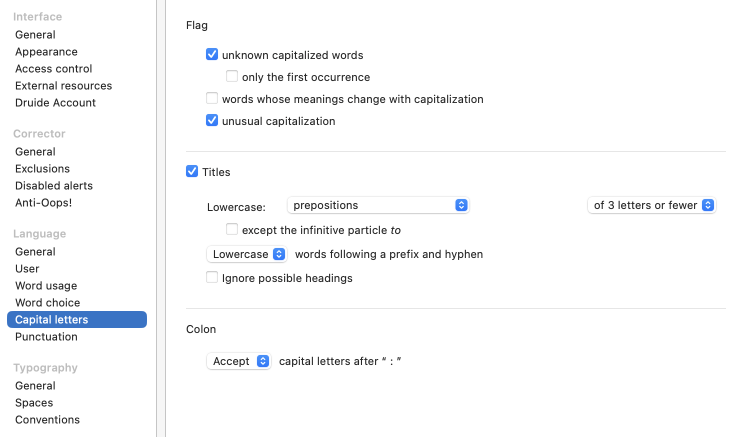Capital Letters Panel of the Language Settings

Flag
Unknown capitalized words
If the corrector encounters a word it does not recognize that begins with a capital letter, it assumes it is a proper noun. This allows it to continue its analysis. If you like, Antidote can alert you when it encounters an unknown word that it assumes to be a proper noun. We strongly encourage you to enable this setting. It warns you that the corrector does not know the word, and you can add it to your personal dictionary, particularly if it’s a name that you often use.
- This setting is enabled by default.
Only the first occurrence
If this setting is enabled, the corrector will alert you only to the first occurrence of an unknown word that begins with a capital letter. The alert will be disabled for subsequent occurrences of the word. However, the alert will be re-enabled if you exit the corrector and relaunch it. This setting can be useful if, in a given text, you use a proper noun several times but don’t want to add it to your personal dictionary.
- This setting is disabled by default.
Words whose meanings change with capitalization
Some words have different meanings depending on whether they begin with a capital letter or not. For example, advent refers to the time leading up to any event, while Advent refers to a particular period in the Christian calendar. If this setting is enabled, the corrector will flag such words.
- This setting is disabled by default.
Titles
Check the Titles box if you’d like Antidote to correct capitalization in titles and subtitles. In title case, all words are capitalized except for articles, coordinating conjunctions and short prepositions. However, capitalization conventions for titles differ depending on the style guide—more specific options, described below, allow you to customize the correction according to your preferences.
Lowercase prepositions of X letters or fewer
Typographic norms vary considerably in English regarding the capitalization of prepositions and subordinating conjunctions in titles. This setting allows you to choose the categories that should be lowercased (only prepositions, or prepositions and subordinating conjunctions), as well as the minimum length for words that should be lowercased: three letters or fewer (e.g. on, if, for, how), four letters or fewer (e.g. on, if, for, how, with, when), or any length (e.g. on, if, for, how, with, when, through, because).
- By default, Antidote lowercases prepositions of three letters or fewer.
- Coordinating conjunctions (e.g. and, or) are always lowercased in titles, so they are not subject to this setting.
except the infinitive particle to
If this box is checked, Antidote requires capitalization of the infinitive particle to. Antidote, however, lowercases to when used as a preposition, in line with the previous setting.
- By default, this setting is disabled (i.e. Antidote lowercases the particle to).
Lowercase or capitalize words following a prefix and hyphen
When a word has a hyphenated prefix, some style guides recommend capitalizing both the prefix and the hyphenated word that follows (e.g. Anti-Intellectual Pursuits), while other guides recommend lowercasing the hyphenated word (e.g. Anti-intellectual Pursuits). Adjust the setting according to your preferred typographic norm.
- By default, Antidote lowercases the hyphenated word that follows a prefix.
Ignore possible headings
If this box is checked, only titles within the body of the text are corrected for capitalization, and headings appearing on their own line are not corrected for capitalization. In this way, you can apply a personal standard to your own headings, while continuing to apply the prescribed standards when referring to external titles within the body of text.
- By default, this setting is disabled.
Colon
Depending on the conventions followed, independent clauses that come after a colon (“:”) can start with either a capital or a lowercase letter. This setting lets you instruct the corrector to require either lowercase or capital letters after a colon or to accept both cases.
- This setting is configured to accept both cases by default.